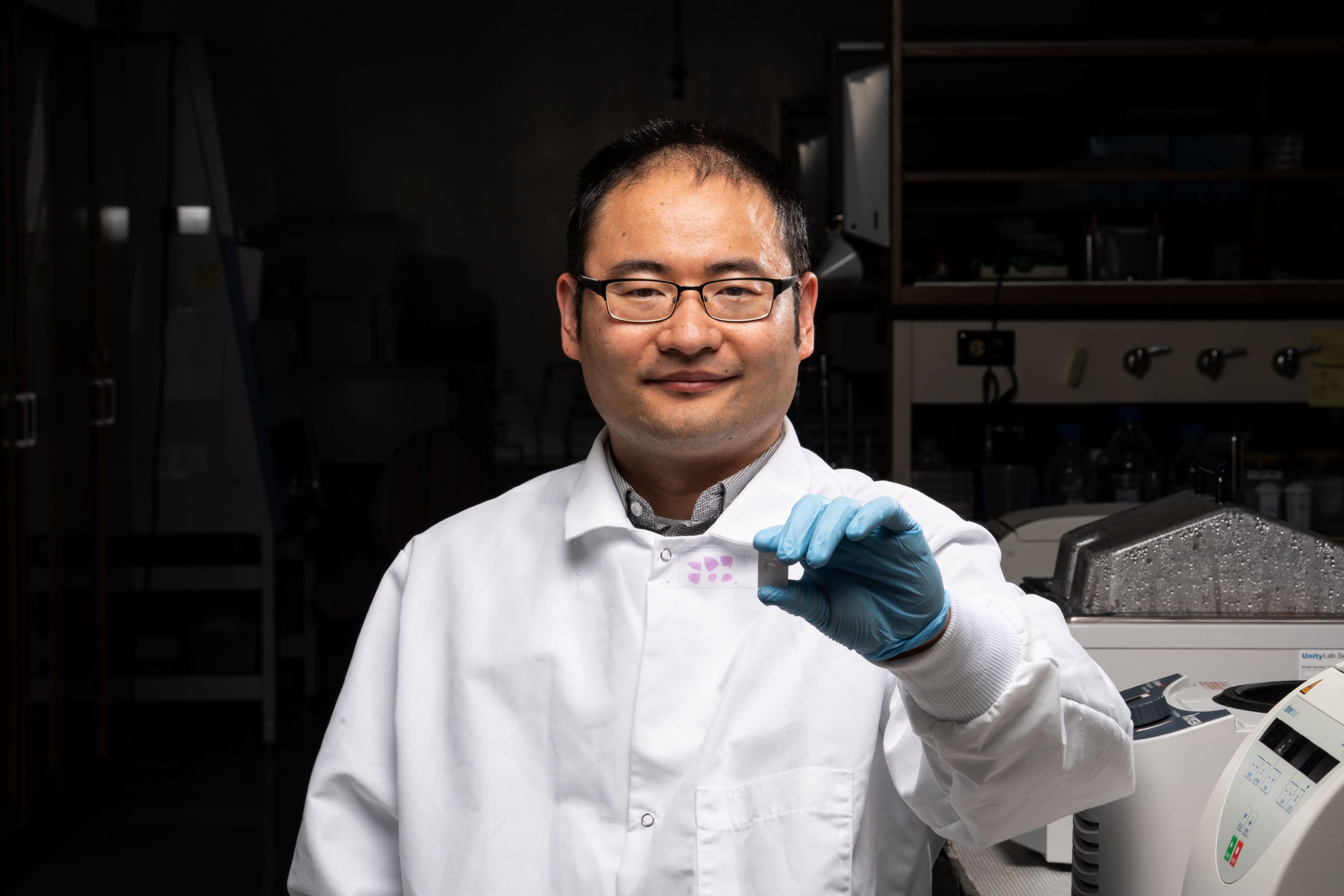Food Science Research
Purdue Food Science faculty conduct research in four major areas within the food science discipline: 1.) food chemistry, structure and function, 2.) foods for health 3.) food safety and microbiology, and 4.) food processing and technology development. Some faculty conduct research in several of these signature research areas as listed in our Research Overview Handout (PDF).
To learn more about each of our faculty, check out our food science faculty research interests slide deck (PDF) and list of faculty with their area of expertise and contact information (PDF).
Keep reading to learn more about each of our signature research areas and some examples of the current research projects in those areas. You can click on each faculty member's name to link to his/her web directory profile page which includes his/her contact information, graduate student and post-doc lab members, select awards and publications.
Research Spotlight
Research Spotlight

Dr. Weicang Wang is investigating how hemp seeds boost gut health by improving microbiome balance. His team will expand studies to explore benefits for other organs, unlocking hemp’s full potential for nutrition and wellness.
Read moreFOOD CHEMISTRY, STRUCTURE AND FUNCTION
FOOD CHEMISTRY, STRUCTURE AND FUNCTION
Identifies and creates new aspects of composition, structure, and other functional properties of whole foods and food constituents using chemistry, biochemistry, and material sciences to improve the quality, nutrition, affordability, stability, and sustainability of food and food-related products.
FOOD CHEMISTRY STRUCTURE AND FUNCTION RESEARCH
- Manipulation of starch digestion rate for low glycemic response/slow digestion
- Dietary fiber, modifications in functionality and fermentability, microbiota changes
- Applying a polymer- and interface-based understanding of the proteins, polysaccharides, and lipids in food
- Investigate the application of affordable, healthy, and eco-friendly resources (e.g. insects) to develop alternative protein sources.
- Investigate ingredient architecture, water-solid interactions amorphization, and crystallization.
- Investigating water-solid interactions that impact the physical and chemical stability of powdered food ingredients
- Use of scanning probe microscopy to development of bioanalytical devices for food science
FOODS FOR HEALTH
FOODS FOR HEALTH
Applies food and biological science principles to the study of whole foods, macro- and micro-nutrients, and bioactive components as a means to improve consumer health and identifies mechanisms by which these effects arise (such as the molecular interactions of food components in biological systems and the role of the gut microbiome).
FOODS FOR HEALTH RESEARCH
- Understanding biological aspects of dietary control of lipid metabolism and obesity
- Unraveling the complex interactions of plant bioactive, gut microbiota and host in health and disease
- Determine the anti-inflammatory potential of different classes of plant bioactive compounds
- Manipulation of starch digestion rate for low glycemic response/slow digestion
- Identifying links between our diets, our gut microbiota, and our health
- Investigate protein's health-promoting properties towards diseases such as hypertension and type-2 diabetes; protein allergenicity, sensory evaluation and consumer attitudes towards these alternative proteins
Dr. Arun Bhunia
Dr. Thaisa Cantu-Jungles
Dr. Yaohua "Betty" Feng - Lab Website
Dr. Bruce Hamaker - Whistler Center for Carbohydrate Research
Dr. Kee-Hong Kim
Dr. Andrea Liceaga
Dr. Stephen Lindemann - Lab Website
Dr. Lisa Mauer
Dr. Eun Joong Oh
Dr. Lavanya Reddivari
Dr. Fernanda San Martin
Dr. Senay Simsek - Lab Web Page
Dr. Weicang Wang
FOOD SAFETY & MICROBIOLOGY
FOOD SAFETY & MICROBIOLOGY
Studies pathogenic, beneficial (probiotic and fermentative), and spoilage microbes and their interaction with food and the host, and develops novel inactivation and detection methods for pathogens.
FOOD SAFETY & MICROBIOLOGY RESEARCH
- Connections between the behavior of gut microbes and our metabolism and immunity
- Influence of diet on resistance to foodborne pathogens
- Studying mechanism of the intestinal phase of infection for foodborne pathogens
- Probiotics in preventing infectious disease and improving gut health
- Development of novel detection and diagnostic tool for pathogens and toxins
- Investigating bacteriophage and molecular methods for pathogen detection
- Determine the routes pathogenic bacteria use to contaminate fruits and vegetables
- Exploring social implications for food safety in the home and commercial setting
- Developing better protocols and people management strategies to improve food safety and quality
- Build food safety systems in developing economies to reduce foodborne disease globally
FOOD PROCESSING & TECHNOLOGY DEVELOPMENT
FOOD PROCESSING & TECHNOLOGY DEVELOPMENT
Integrates engineering, chemistry, nanotechnology, environmental sciences, and microbiology through food processing operations to produce safe, nutritious, sustainable, and value-added products.
FOOD PROCESSING & TECHNOLOGY DEVELOPMENT RESEARCH
- Assessment of environmental sustainability of agri-food systems
- Green cleaning and fouling mitigation in food processing
- Developing non-thermal processing technologies for foods
- Seeking ways to further automate food processing
- Application of computational modeling and simulations of food processing operations
- Overcoming barriers to commercialization of food processing technologies
- Studying rheological characterization of biopolymers and processing application of nanofluids
- Nanotechnology approaches to improve the physical and chemical properties of food
- Nanotechnology approaches to the delivery of antimicrobial compounds for food safety
- Testing processing technologies for biomass conversion to food, fuels, and chemicals
- Improving and sustaining grape and wine quality in a changing climate
Research and Outreach Centers
Our mission is to fuel economic growth in the region and beyond by enabling food and beverage companies to ideate, develop, and commercialize novel improved and sustainable products; to provide learning experiences in innovation and entrepreneurship for students in the College of Agriculture; and to contribute to the land-grand research and Extension missions of Purdue University. Visit the Food Entrepreneurship and Manufacturing Institute webpage to learn more.
In partnership with member companies, the center's research focuses on fundamental investigations of structure-function relationships of carbohydrates and other biopolymers as related to practical uses. For more details, visit the Whistler Center for Carbohydrate Research website.
